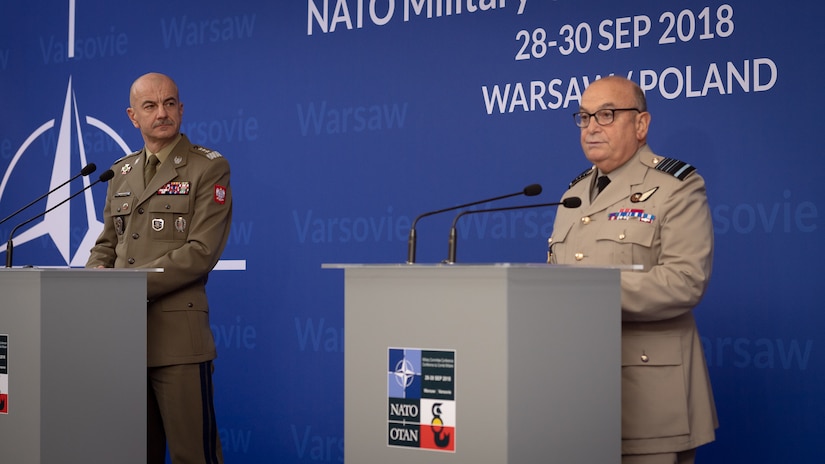By Jim Garamone, DoD News, Defense Media Activity
WARSAW, Poland -- The NATO Military Committee reaffirmed the
alliance’s commitment to Afghanistan and Iraq and moved ahead with plans to
restructure NATO to improve its military capabilities, the committee’s chairman
said here last night.
This was British Air Chief Marshal Sir Stuart Peach’s first
meeting of the alliance’s defense chiefs as the chairman of the Military
Committee. He said the discussions among the 29 chiefs of defense – including
Marine Corps Gen. Joe Dunford, the chairman of the Joint Chiefs of Staff –
“were frank and thought-provoking throughout.”
Peach spoke alongside Lt. Gen. Rajmund Andrzejczak of the
Polish army, Poland’s top military officer, who hosted the meeting.
The chiefs have given their guidance on a number of issues
facing the alliance, Peach said, and that guidance will be discussed further at
the meeting of NATO’s defense ministers in Brussels this week.
The chiefs support current NATO operations and looked for
better coherence and coordination with organizations operating in the same
regions with similar goals, the committee chairman said.
The chiefs understand that Afghanistan still faces
significant challenges, but they still support the fight in that country, Peach
said, acknowledging that the Taliban and terror groups continue to visit
violence on the people of Afghanistan and continue to challenge Afghan forces.
“But in the face of these challenges, Afghan security forces
are doing an outstanding job,” the air marshal said. “They have now been in the
lead for three years, and we welcome their determination and commitment to
improve their ability to conduct offensive operations, to develop their special
forces, their air force and other capabilities -- and above all, to deny the
Taliban their strategic objectives.”
Peace Through Reconciliation
The NATO mission in Afghanistan is to support, train, assist
and advise Afghan forces. The ultimate goal for the country is peace through
reconciliation. “An Afghan-led and Afghan-owned peace process is essential to a
long-term, inclusive political settlement,” Peach said.
The NATO mission in Iraq will be modest and scalable and
complement the efforts of coalition nations in the country, he said.
The chiefs looked at current means and capabilities and what
will be needed in the future, Peach said. This included a look at the
deterrence posture today and what forces in the future will need to ensure
security and stability in the future.
“We stressed the need to look to the future, and where
possible, anticipate future requirements, based on the analysis provided by our
strategic commanders,” he said. “We emphasized that the strategy should guide
all current and future military work strands, including emerging domains.”
The chiefs doubled down on support for the NATO Readiness
Initiative. This grew out of the alliance’s summit in July, and it looks to
increase responsiveness, heighten readiness and improve reinforcement across
the alliance, he said.
Wide Range of Threats
The committee chairman noted that the alliance faces a wide
range of threats and challenges from existential problems, including Russia,
terrorism, criminal gangs and individuals. “The chiefs of defense highlighted
the importance of keeping pace with technological advances through a focus on
innovation,” he said.
Questions from reporters for the air marshal were all about
Russia, not surprising, given where this meeting occurred. Peach addressed the
risks emanating from the country, but he noted that NATO is a large and capable
military organization.
“NATO has the capability to understand the risk picture it
faces, and sometimes those risks can turn into threats, but NATO studies the
risks that are out there as they evolve and continues to adapt to them,” he
said.
He noted that the alliance’s Enhanced Forward Presence
initiative in the Baltic Republics and Poland is a response to Russia illegally
annexing Crimea from Ukraine and fomenting war in eastern Ukraine. “And in that
sense, NATO continues to deter,” the air marshal said.
But there are threats to the south, too, , and there are
different threats and perceptions, depending on where one stands.
“We do not have the time to go through all of them, but they
will vary with the geography of the alliance,” Peach said. “At the moment, we
have a series of risks that we have identified, and we respond with presence,
with training, with exercises in order to generate deterrence. … That is what
the alliance is for. And that provides the sense of collective security for the
people of Poland and the people of the other NATO allies.”

No comments:
Post a Comment